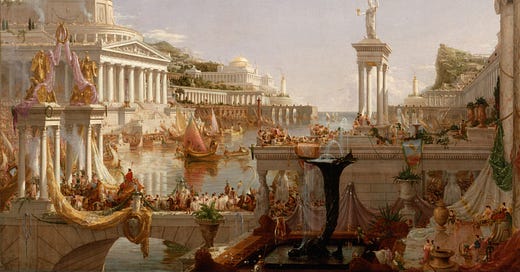We are citizens of Western nations who believe our best days lie ahead—not in thoughtless populism or supranational surrender, but in a principled renewal of liberal democracy within sovereign nation-states.
We are liberal nationalists because we see the dignity of the individual and the sovereignty of the people not as opposing values, but as mutually reinforcing. The freedom of the individual flourishes most securely within the bonds of citizenship, civic equality, shared language, democratic law, and national loyalty.
We reject the false choice between liberalism and nationalism. A revitalized liberal nationalism offers the only durable foundation for democratic freedom, economic vitality, and social trust in the 21st century.
We affirm the following principles:
1. National Sovereignty and Democratic Self-Government
The nation-state is the cornerstone of democratic liberty. Each nation has the right and duty to govern itself, to control its borders, and to make laws through democratic institutions answerable to its citizens—not to unelected global bureaucracies or ideological tribunals. Supranational bodies may assist cooperation but must never supersede the democratic will of sovereign peoples.
2. The Freedom of the Individual
Freedom of conscience, speech, association, enterprise, and religion are not privileges granted by the state, but rights inherent in human dignity. These freedoms require political protection and cultural reinforcement. We stand against authoritarianism from the left or right, and against all ideologies—woke or theocratic—that seek to crush the individual under collective conformity.
3. Citizenship as a Unifying Ideal
Citizenship binds a diverse people into a shared destiny. Civic nationalism, grounded in equal rights and reciprocal duties, is the moral core of the democratic nation. It transcends race, class, and creed. Citizenship should be honored, not diluted, and never outsourced to supranational entities or reduced to mere residency.
4. Controlled Borders, Shared Obligations
Borders are not a betrayal of freedom; they are what make freedom politically possible. We support strict, lawful immigration controls and the primacy of national interest in immigration policy. Integration must be real, not rhetorical. A generous society requires borders firm enough to preserve the trust on which generosity depends.
5. The Rule of Law and Equal Justice
Liberal nationalism demands equality before the law. Legal systems must protect the rights of all citizens, regardless of origin or identity, while being vigilant against mob violence, political censorship, or ideological policing masquerading as justice.
6. Free Enterprise with National Purpose
Markets are essential to prosperity and liberty. But they only exist to serves these ends. Economic freedom must be paired with civic responsibility. We support free enterprise, but reject the market fundamentalism that leads to negative societal outcomes in order to purse free markets as an end in themselves.
7. Institutions Depend on Culture, Not Just Law
A free society cannot endure without high-trust institutions—and those institutions, far from being abstractions or technical artefacts, are embedded in the political culture and demographic makeup of the nation. Institutional quality depends not merely on formal constitutions or the letter of the law but on the informal moral norms, cultural traditions, and civic behaviors of the citizenry.
As the “deep roots” literature in institutional economics increasingly shows, it is the deeply internalized habits of trust, reciprocity, and self-governance that enable modern liberty and prosperity. These norms cannot be assumed to be universal, nor can they be preserved in the face of radical social disruption. They emerge from a long civilizational development and must be stewarded carefully through conscious national policy.
8. Demographic Change is Not Institutionally Neutral
Liberal nationalism affirms that open debate about immigration, integration, and institutional continuity is essential to the continued prosperity of Western nations. As democratic nations undergo rapid demographic shifts, it is essential to ask whether the political culture underpinning liberal institutions can survive that unchecked transformation. A nation that cannot defend the preconditions of its freedom will not remain free for long.
9. Public Institutions That Serve the Nation
Schools, universities, and cultural institutions must transmit democratic values, national history, and civic ethics. Public funding must not subsidize those who despise the nation that sustains them. A free society cannot afford to abandon its public institutions to ideological capture.
10. Families as Foundations of Freedom
Strong families are essential to raising free and responsible citizens. We support policies that ease the burden of raising children, honor parental authority, and foster economic security for young families. But we reject state intrusion into family life and the weaponization of identity politics against traditional bonds of kinship and care.
11. Religion and Conscience in a Free Society
A liberal nation respects the religious and moral convictions of its citizens. It defends freedom of belief and worship, while upholding the neutrality of the state in matters of faith. Public life must be open to moral argument, but not subject to religious coercion or dogma.
12. National Unity Through Civic Patriotism
Western societies cannot endure if they teach their citizens to loathe themselves. A liberal nation must foster a sense of pride in its achievements, acknowledge its failings honestly, and invite all citizens—regardless of background—to participate in a common civic project. This is not nationalism of blood or soil, but of shared values and mutual loyalty.
In an age of confusion—between liberty and license, between cosmopolitanism and tribalism—we reaffirm the wisdom of liberal democracy grounded in national sovereignty. It is not liberalism that has failed the West, but the retreat from nationalism into globalist abstraction or shallow, thoughtless and extreme libertarianism.
To recover our freedom, we must recover the nation—not as a fortress, but as a home.




Great stuff.
Point 11. Religion, would be the sticking point for me. Religion needs reverse engineering in the 21st century. The rest is sound and worthwhile. Thanks for articulating a framework.